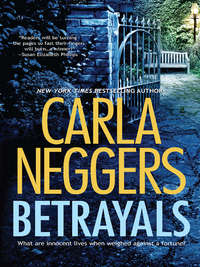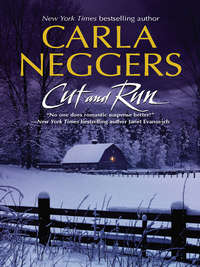
Полная версия
Cold Ridge
She suddenly felt nosy, as if she’d overstepped her bounds. “Have you talked to Manny Carrera? Do you know where he is?”
“Carine—perhaps it’s best if you go home.” Sterling’s voice was gentle, concerned, but there was no mistaking that he wanted to be rid of her. “The police know how to get in touch with you if they want to speak with you again, don’t they?”
“Of course—”
Gary Turner, Sterling’s security chief, appeared in the doorway next to his boss. He nodded at her. “Good morning, Carine,” he said politely. “It’s nice to see you, as always. The two lead detectives will be back later this morning. I’ll tell them you stopped by.”
Dismissed, Carine thought, but without rancor. Sterling was just as on edge as she was, neither of them accustomed to dealing with this sort of emergency. But Gary Turner radiated calm and competence, a steady efficiency, that she found reassuring. He was a strange guy. The Rancourts hired him in the spring, and she’d met him in Cold Ridge a few times before she went to work for them herself. She didn’t understand exactly what he did, or what Manny Carrera was supposed to be doing, for that matter.
She was aware of Turner studying her, an unsettling experience, not just because he was so focused—he looked as if he’d lived most of his life underwater, or maybe in an attic. He had close-cropped, very thin white hair. He might have been in his eighties instead of, at most, his forties. His skin was an odd-looking pinkish-white, its paleness exaggerated by his habitual all-black attire. He had no eyebrows to speak of, and his eyes were a watery, almost colorless gray. He was missing his middle and ring fingers on his left hand. Carine knew he carried a concealed nine-millimeter pistol and assumed he could fire it, but she’d never asked.
“How are you doing?” Turner asked softly. “I’m sorry I didn’t get a chance to talk to you yesterday.”
“You were busy, and I’m doing fine. Thanks for asking. Look, I’m sure you both have a lot to do. I won’t keep you—”
Turner stepped out onto the stoop with her. “You’ve experienced a trauma. Finding Louis yesterday was a physical and mental shock, a blow on multiple levels to your well-being. Perhaps you’d like for me to arrange for you to talk to someone?”
She shook her head politely. “There’s no need to go to any trouble. I can always ask my sister for a recommendation, if it comes to it.”
“Give yourself some time. It’ll be hard for a while, but if after a few weeks you experience flashbacks, nightmares, sleeplessness, feelings of panic or emotional numbness—then don’t wait, okay? Go see someone.”
“I will. Manny Carrera—I’m worried about him—”
“That’s understandable,” Turner said mildly, then glanced back at Rancourt, who seemed paralyzed in the doorway. “I’ll walk with Carine a minute.”
“Of course. I’ll see you back here later.” Rancourt rallied, taking a breath. “Carine? If there’s anything Jodie and I can do, please don’t hesitate to let us know. I mean that. I’m so very sorry it had to be you yesterday.”
“Thanks,” she said. “I’m just sorry about Louis.”
“The media—” Sterling paused and leaned forward to glance down the street, as if he expected someone to pop up out of nowhere. “I’d like you not to speak to any reporters. It’s quiet at the moment, but they’ll be back. Be polite, but be firm.”
“Not a problem. The last thing I want to do is talk to a reporter.”
He withdrew without further comment, the heavy door shutting with a loud thud behind him.
Gary Turner walked down to the sidewalk without a word, and Carine followed him, her knees steadier, her stomach still rebelling. “I shouldn’t have come,” she blurted. “I have no business being here. There’s nothing for me to do, and you and the Rancourts must have your plates full.”
“You thought it would help you to revisit the scene,” Turner said.
“I suppose I did.” They crossed Commonwealth to the mall, where a half-dozen pigeons had gathered on dried, fallen leaves. There was no toddler today. Carine felt none of yesterday’s sense of peace with her life in Boston. “I’m not sure I really know what I was thinking.”
“You’re fighting for some sense of normalcy.” Turner spoke with assurance, as if he knew, then fastened his colorless eyes on her. “Did you drive?”
“I took the T to Charles Street and walked.”
“Walking’s good. Keep it up. And eat right. Don’t overdo anything. It’s good to try to follow your normal routines as much as possible, even if you’re not working.” He smiled at her, seeming to want to help her relax. “Fortunately, your work lends itself to an erratic schedule—you’re used to switching from one job to another. It’s not like you’ve been getting up every day for the seven-to-three shift at the factory and suddenly there’s no factory.”
“That’s true. I appreciate the advice, but please don’t worry about me.”
He paused, folding his hands behind his back as he walked smoothly, steadily. “But people do worry about you, Carine,” he said finally. “I expect they can’t help it, and you might benefit from their attention. Don’t try to control what other people are feeling. Right now, just focus on what you need. The rest of us will manage.”
“Mr. Turner—”
“Gary.” He laughed, shaking his head. “You call Sterling Rancourt by his first name, but me—”
She tried to return his laugh. “I think it’s because you carry a gun.”
“Ah. Well, for you, Carine, I’d take it off, if it would make you feel more at ease.”
“That’s not necessary.” She picked up her pace, feeling a fresh surge of awkwardness. She never knew what to say to him. She changed the subject. “I’ve known Manny Carrera for a long time. Do the police suspect him of being involved in Louis’s death? Because it’s not possible—”
“The police don’t tell me what they think. One step at a time, Carine. Keep your focus on the here and now. Don’t think back, don’t think ahead. It’s the best advice I can give you. Mr. Carrera is perfectly capable of taking care of himself.” Turner stood back a moment, then frowned at her in a way she found faintly patronizing. “You aren’t thinking of playing amateur detective, are you?”
“No! It’s just that Manny’s a friend. Do you know where he’s staying?”
“If I did, I wouldn’t tell you.” There was no hint of condemnation in Turner’s tone. “Take yourself out to lunch, Carine. Treat yourself to dessert. Browse the galleries on Newbury Street. Do you have a friend who can join you?”
“Most of my friends are working, but—”
“Your sister?”
“She’s in Washington. She’d come if I called her.”
He looked at her. “But you won’t. You’re a strong woman, Carine. Stronger, I think, than people often realize at first.”
Hey, Ms. Photographer.
Poor Louis. Dead. She still could see the blood on his fingers.
Louis Sanborn was not a nice man.
Manny, clear-eyed and uncompromising. What did he know about Louis?
Carine swallowed hard, pushing back the memories of yesterday. Turner was right—she needed to stay focused on the present. “To be honest, I don’t worry about whether or not people think I’m strong. Louis stopped me on my way back from lunch and asked if I wanted a ride. If—”
“Don’t. No ifs. They’ll drive you crazy.” Turner squeezed her upper arm. “Take it easy on yourself, okay? Go take some pretty pictures. You didn’t do anything wrong yesterday. Remember that.”
She blinked back sudden tears, feeling light-headed, her stomach not so much nauseated as hurting. “Thanks.” Her voice faltered, and she cleared her throat, annoyed with herself. “I just need some time, I guess.”
“Newbury Street. Art galleries.” He started across Commonwealth, pausing halfway into the lane of oncoming traffic and shaking his head at her. “You might want to hold off on the dessert. You’re looking a little green.”
She managed a smile. “It wouldn’t be a good idea to get sick on Newbury Street, would it?”
He chuckled. “You’d be banned for life.”
Sterling Rancourt stared into the library, its wood floor still marred by crime-scene chalk and dried blood. The police forensics team had done its work, and a cleaning crew that specialized in ridding all trace of this sort of mess was due in that afternoon. Gary Turner had arranged for it. He’d been incredibly helpful—steady, knowledgeable, even kind.
Gary was in his office in the Rancourt building in Copley Square at the time of the shooting, while Sterling was enduring an interminable business lunch a few blocks over at the Ritz-Carlton Hotel. Afterward, he’d planned to meet his wife at a designer showroom on Newbury Street, so she could model an evening gown she wanted to wear to a charity ball over the holidays. She liked having his approval. Ten years ago, she’d bought a dress he didn’t like, and he’d been stupid enough to say so—now she insisted on these modeling sessions for anything that cost more than a thousand dollars.
But he’d received the news about Louis at lunch and excused himself, heading straight over to Commonwealth Avenue, calling first Jodie, who was on Newbury Street, then Turner. They all met at the house, where police and reporters were already swarming. Detectives quickly pulled aside Carine Winter, white-faced but functioning, and Manny Carrera, as stalwart as ever. Sterling was unable to speak to either of them alone.
Jodie had remained at their South Shore home this morning. She said she didn’t want to see or speak to anyone unless she had to—as far as she was concerned, if the police wanted to interview her again, they could drive down to Hingham and find her.
She knew nothing, Sterling thought. None of them did. Louis Sanborn had been in their lives for two weeks. That was it.
Manny Carrera couldn’t have killed him. Manny saved lives. He only took a life when he came under enemy fire and had no other choice. Sterling had read up on PJs and their heroic work, although Manny and Tyler North would be the last to call what they did heroic. It wasn’t false humility—Sterling would have recognized it if it were.
He and Jodie owed Manny Carrera their lives. But if the police wanted to waste their time pursuing him, that was their choice. There was nothing Sterling or anyone else could do.
“Mr. Rancourt?”
Gary Turner walked down the hall, his nearly colorless eyes and extremely pale skin disconcerting, off-putting even before anyone had gotten to the point of noticing the missing fingers. But he was quiet and supremely competent, and Sterling knew better than to underestimate him because of his strange appearance. Jodie said she found him fascinating, even sexy in a weird way. He wasn’t ex-military or ex-law enforcement—Sterling suspected he was ex-CIA. Whatever the case, his credentials in private and corporate security had checked out. He hadn’t said a word when Sterling hired Manny Carrera as a consultant. Either he was too self-disciplined to criticize his employer’s decision, or he approved. Sterling hadn’t asked him his opinion.
“Carine’s on her way?”
Turner nodded. “She doesn’t know what to do with herself.”
“A shock reaction. She’ll rally. It just might take a little more time than she wants it to. I’ve met her brother and sister—and her uncle—and they’re all strong, resilient people.”
But he could tell concern over Carine Winter wasn’t why Turner was here. The man shifted slightly, lowering his voice although there was no one within earshot. “There’s been a new development. Tyler North is in town. I just saw his truck on Comm. Ave.”
“Tyler? Interesting.” Sterling didn’t share Turner’s sense of drama over this news. Of course Tyler would be here if was able to. He’d known Carine since childhood and had almost married her in February, and Manny was a friend. They’d gone on missions together. “He must be on leave—he’ll have heard about Manny’s predicament. Word like that travels like wildfire.”
“I don’t think he’s here because of Mr. Carrera. Not directly.”
Sterling nodded, sighing. “Of course. Carine.” He pictured Tyler North, a compact, rugged man, incredibly loyal despite being something of a loner himself. “Well, she won’t like it, but I suppose having him here will be a distraction for her.”
“What do you want me to do?” Turner asked.
“About Tyler?”
Sterling thought a moment. He hated the situation he was in, how out of control it felt. Boston’s best homicide detectives were on the case, but he wasn’t involved—they didn’t answer to him. A man, an employee, had been found murdered in a house he owned. Everything about him and his life was fair game. Yet the murderer was probably a drifter, a petty thief or a drug addict, who’d wandered in after Louis stupidly left the door open and, for reasons that might never be known, decided to shoot him.
The police had no motive, no murder weapon, no suspect in custody. Until they did, Sterling thought, he and Jodie, Gary Turner, Carine Winter, Manny Carrera—none of them would have much room to maneuver.
“Tyler’s a friend,” he told Turner. “Do nothing.”
Six
Boston Public Garden, which dated back to 1859, was one of Carine’s favorite places in the city. Its curving Victorian paths, lawns, gardens, statues, benches and more than six hundred trees were enclosed within arched, wrought-iron fences, making it feel like a retreat, as if she’d stepped back in time.
If only she could step back to yesterday morning, she thought. She could warn Louis not to go back to the Rancourt house alone—delay him, get in the car with him, talk him into watching the pigeons with her.
She crossed the small bridge over the shallow pond where the famed Swan Boats, a century-plus tradition, would cruise during warmer months. They were put away for the season, and now just fallen leaves floated on the water. But she didn’t linger, instead took a walkway over to Tremont Street and the Four Seasons Hotel. When the Rancourts had people in town on business, they tended to put them up at the Four Seasons. Manny Carrera couldn’t afford it on his own. Neither could she, but if she wasn’t paying the tab, she’d stay there. Maybe Manny would, too.
She entered the elegant lobby and wandered over to a seating area that looked across Tremont to the Public Garden, its soft sofas and high-backed chairs occupied by a handful of well-dressed men and women in business attire. Carine felt out of place in her barn coat but didn’t worry about it—she didn’t plan to stay.
She spotted Manny on a love seat in front of a window as he drank coffee from a delicate china cup. He wore a dark suit with a blue tie and motioned for her to join him, shaking his head as she sat on a chair opposite him. “I saw you beating a path across the park. Got a brainstorm I was here?”
Конец ознакомительного фрагмента.
Текст предоставлен ООО «ЛитРес».
Прочитайте эту книгу целиком, купив полную легальную версию на ЛитРес.
Безопасно оплатить книгу можно банковской картой Visa, MasterCard, Maestro, со счета мобильного телефона, с платежного терминала, в салоне МТС или Связной, через PayPal, WebMoney, Яндекс.Деньги, QIWI Кошелек, бонусными картами или другим удобным Вам способом.









